Create successful ePaper yourself
Turn your PDF publications into a flip-book with our unique Google optimized e-Paper software.
<strong>Energy</strong><br />
Six gensets supplied by <strong>MTU</strong> <strong>Onsite</strong> <strong>Energy</strong> can start up within a few seconds and generate control energy as well as emergency and peak-demand power.<br />
tertiary or short-term operating reserve energy.<br />
That has to be available within 15 minutes of<br />
being called upon. However, with the new <strong>MTU</strong><br />
<strong>Onsite</strong> <strong>Energy</strong> gensets, ÜWAG will be also be<br />
able to supply the substantially more lucrative<br />
secondary reserve power. To do so, a provider<br />
has to be capable of supplying 100% of the<br />
registered capacity within 5 minutes. Generating<br />
and delivering electricity that quickly is a major<br />
challenge because not only do the generators<br />
have to start up from standstill, they also have to<br />
synchronize their frequency, voltage and phases<br />
with the combined grid system within a matter of<br />
seconds. “Our modules can only do that because<br />
they are highly sophisticated and perfectly<br />
integrated systems made up of engine, generator<br />
and engine controller,” explained Dietmar<br />
Witzigmann, who was in charge of the project at<br />
<strong>MTU</strong> <strong>Onsite</strong> <strong>Energy</strong>.<br />
Backup supply for emergencies<br />
That ability to supply energy within a few seconds<br />
also benefits the local population. Because ÜWAG<br />
not only provides peak-demand and control power<br />
for the big power grids, it also supplies electricity<br />
to the city of Fulda. If the national grid suffered<br />
a failure, the generators at ÜWAG would make<br />
sure all the lights do not go out. In that case,<br />
a “blackout startup” genset that requires no<br />
external electric pumps or auxiliary equipment to<br />
fire up automatically starts up and supplies the<br />
energy for the other five gensets to be started.<br />
Together, they can supply 24.8MW of electricity<br />
to power the street lights, traffic lights, hospitals,<br />
care homes, refuge hostels and community<br />
buildings. “Fulda is one of the few towns in<br />
Germany that can do this,” recounted Frank<br />
Weinmann confidently. So far, such an emergency<br />
has not happened, but the energy expert is<br />
certain that the Germany can expect to see more<br />
power bottlenecks in the future.<br />
Challenging conversion<br />
Project Leader Sven Kunkel was in charge of<br />
converting and updating the power plant. It<br />
was a considerable challenge for the electrical<br />
engineer because diesel engines had not been<br />
his specialist area before then. “I know all about<br />
power grids. But electricity generators were not<br />
part of my world before,” he smiled. There is little<br />
evidence of that now. Full of enthusiasm, he told<br />
of the many challenges he faced. It started even<br />
before the conversion because the power plant<br />
was actually too small for his plans. He wanted<br />
to be able to generate nearly 25MW of electrical<br />
power – as cleanly, economically and reliably<br />
as possible. “I did consider whether we should<br />
extend the plant, but that would have involved<br />
<strong>MTU</strong> Report 03/12 I 61


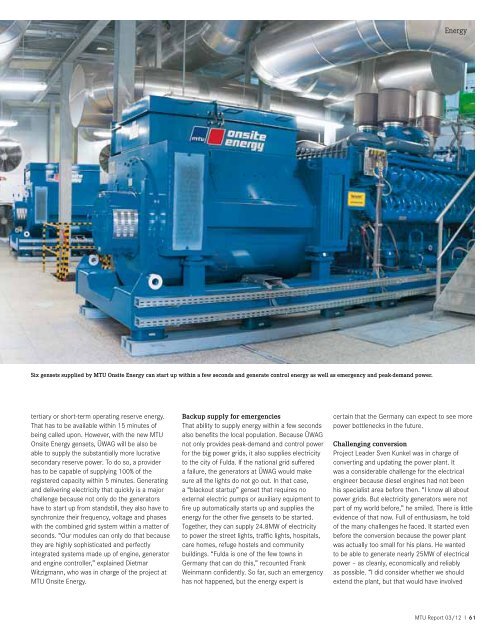





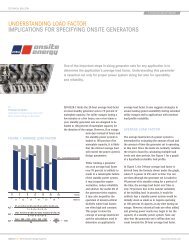

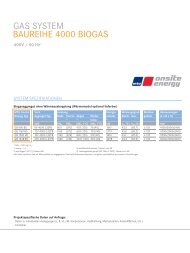
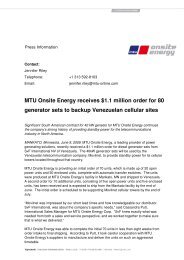

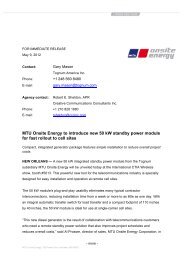

![Full power range of diesel generator sets [PDF] - MTU Onsite Energy](https://img.yumpu.com/28297693/1/190x253/full-power-range-of-diesel-generator-sets-pdf-mtu-onsite-energy.jpg?quality=85)
